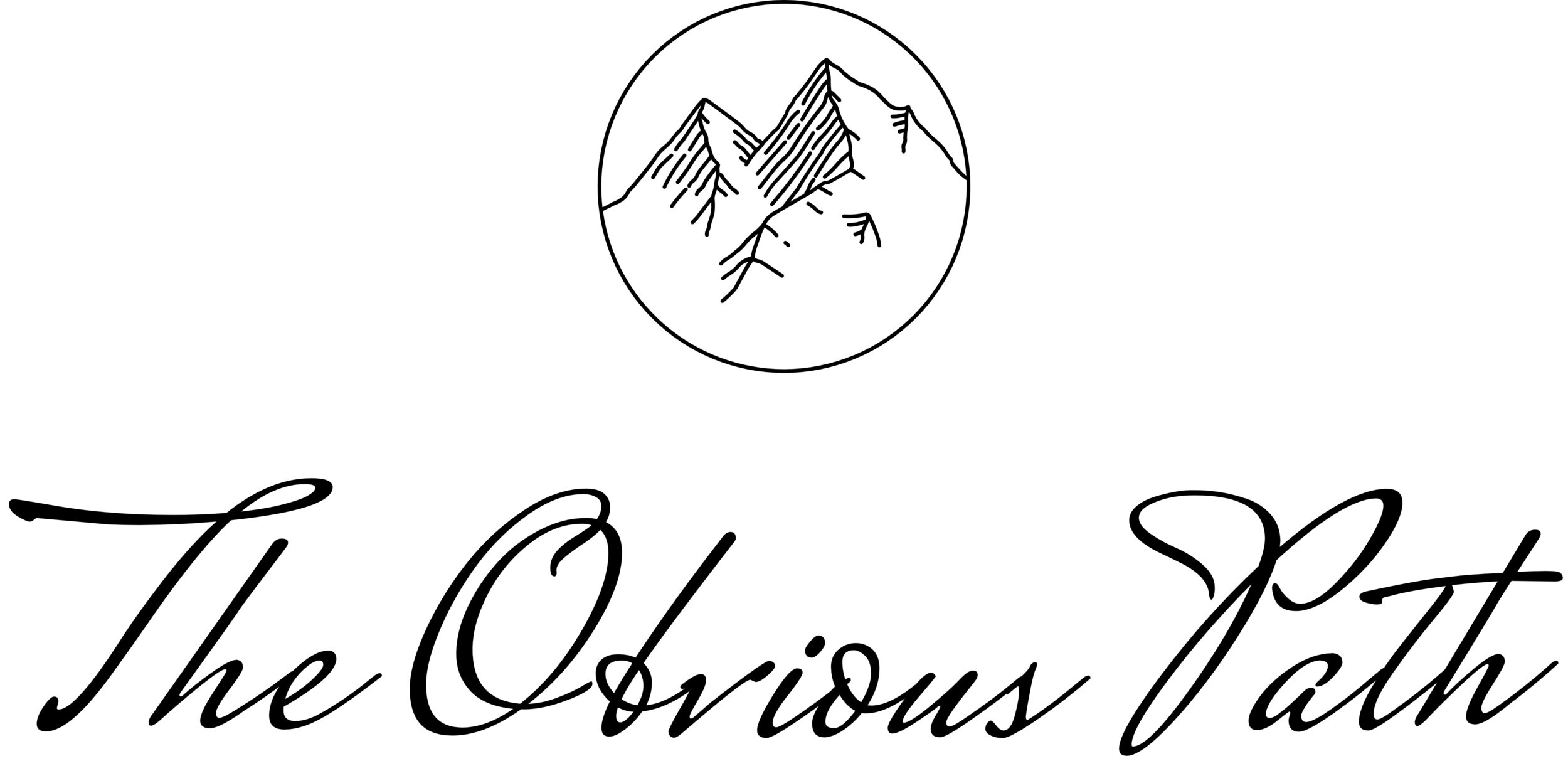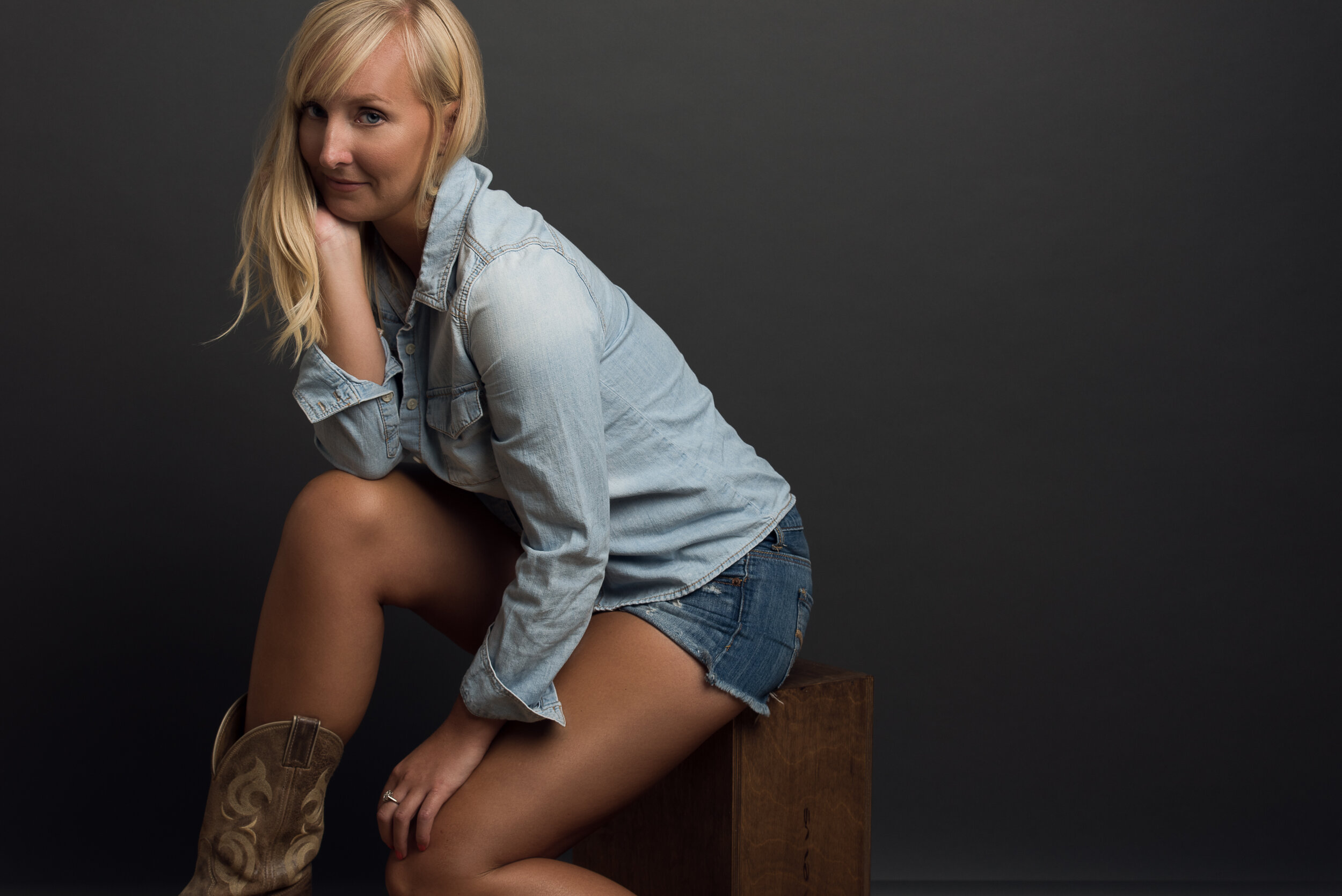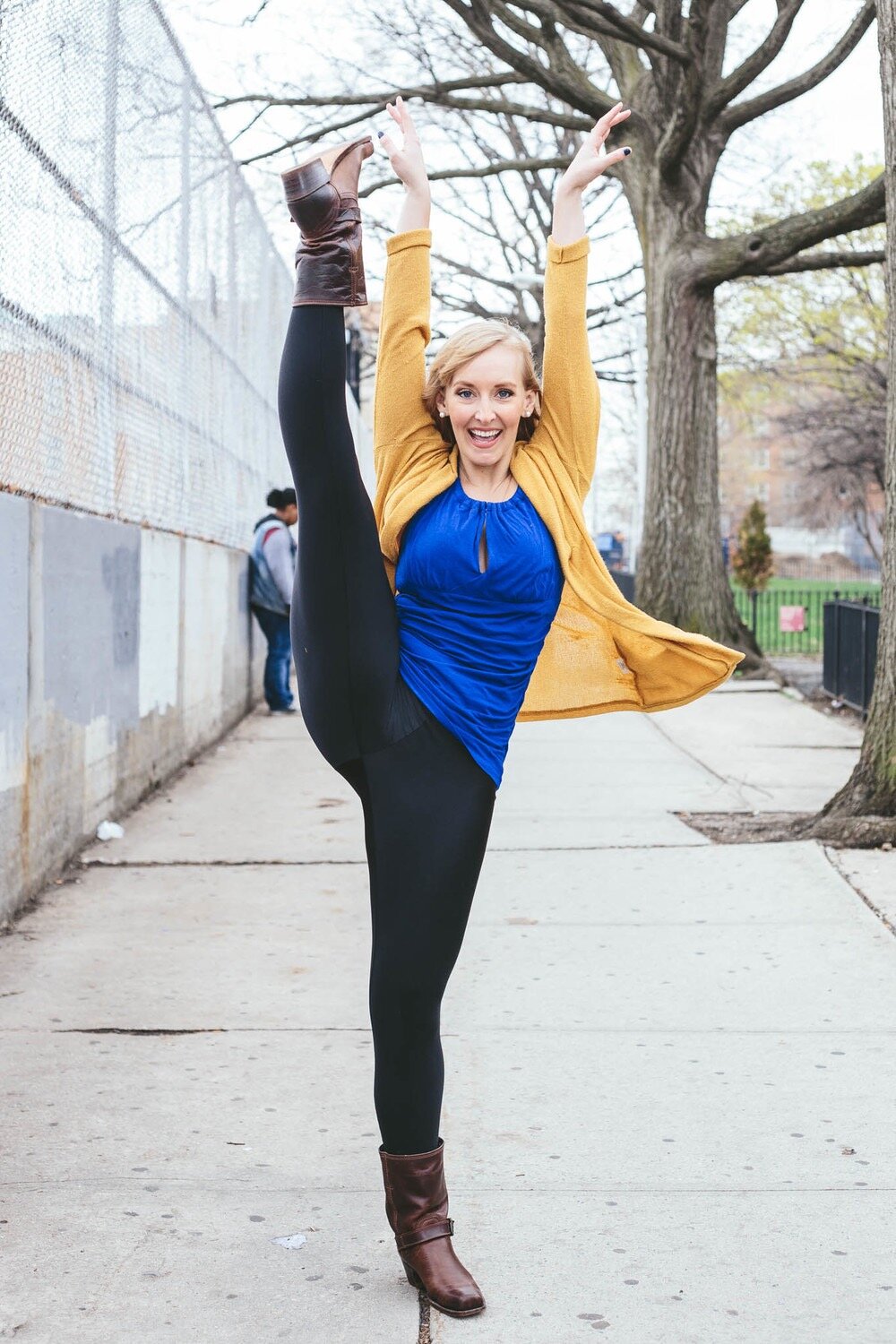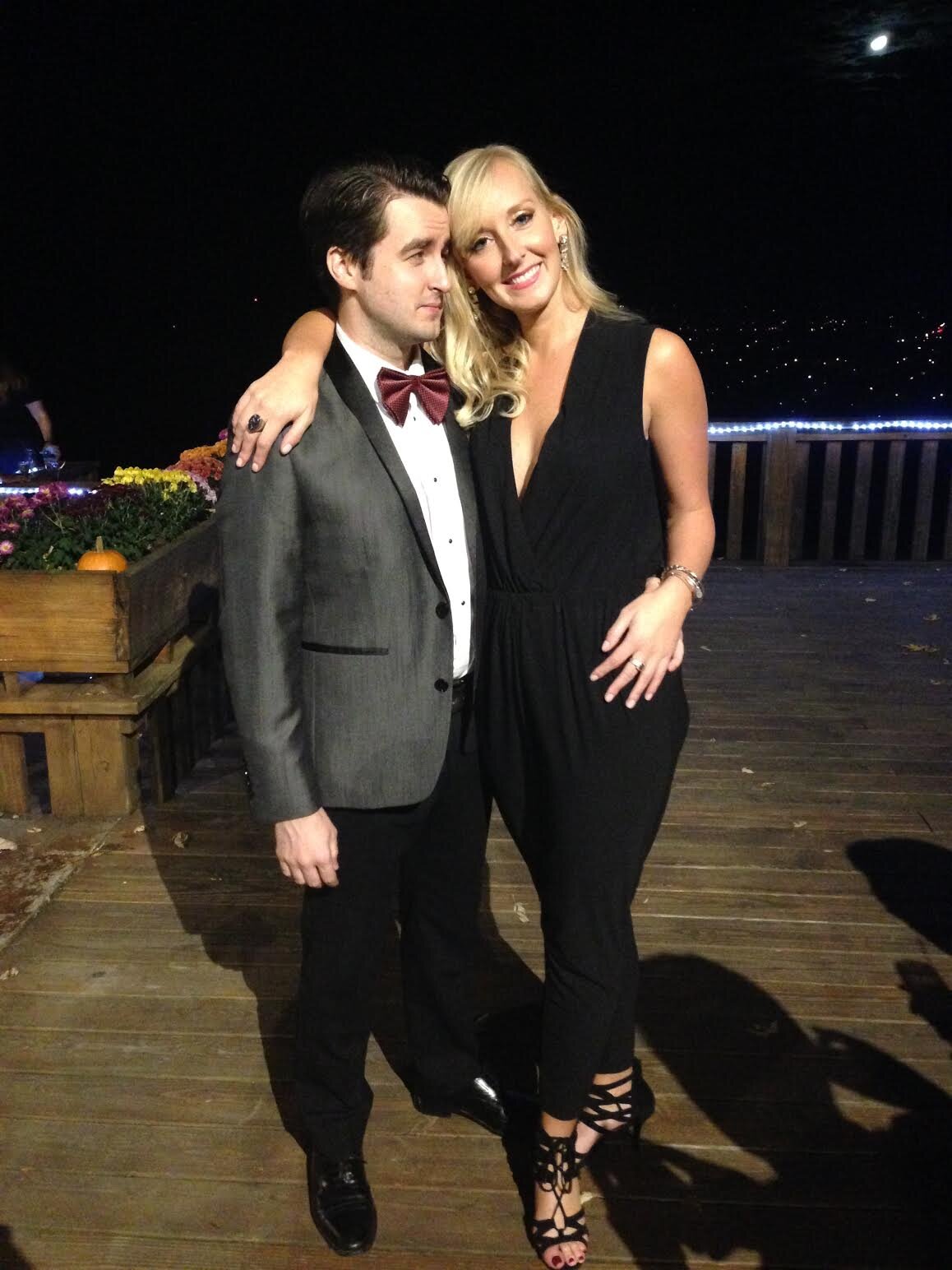Anne Marie Snyder
From Kat: I worked with Anne Marie at Flat Rock Playhouse (YES- the same summer as fellow 'pathers' Ginna Claire Mason and Alex Hairston). Anne Marie was a "second-year" that summer. The theatre loved her so much her first year, that they asked her back to lead and mentor us "first-years". After five minutes of talking with her, it was obvious why they had her back. She is encouraging, welcoming, and talented to boot. Anne Marie shared so much wisdom with me that summer and became a wonderful friend as well.
We instantly thought of Anne Marie's story for The Obvious Path, because although it's filled with success, it's also not the typical one. It started under Jennifer Garner's skirt (she'll explain), a financially motivated college decision, and a few years finding footing in NYC. Through it all, Anne Marie has remained a risk-taker, a hard worker, and one of the most humble people I've ever met. Her path resonated deeply with us small town, small school folks. She gave us a lot to think about and we know she'll do the same for you. Meet our good friend, Anne Marie Snyder:
Anne Marie! My friend of nine years/The National tour Queen/one of the most humble people we know. Can you please introduce yourself to our readers?!
Hi, Kat! Thanks so much for asking me to be a part of your amazing project. I’m truly honored. I was born and raised in Charleston, West Virginia. I started dancing at the age of four. Jennifer Garner was my first dance teacher. My “interesting fact” about myself is always that I’ve been under Jennifer Garner’s skirt. I don’t explain until people ask, but she played Mother Ginger in The Nutcracker, and I was a bon bon that appeared from under her huge skirt. I have it on film. So I danced my whole life, eventually focusing on ballet in middle school. I went to West Virginia University where I got a bachelors of science from the school of medicine. I have lived in NYC on and off since October of 2010, and I currently live in Astoria with my friend, Adrienne, and recent fiancé, Richard. We just got engaged the day before Thanksgiving!
I have so many questions!! Starting off, you went to West Virginia University and majored in Exercise Physiology and Aquatic Therapy with a minor in Theatre and Dance. (You know... like most of us!) Can you talk to us about how you ended up there? Did you have a showcase of any sort out of school? What brought you to NYC?
So as I said before, I was a dancer and started focusing on ballet in middle school. I joined The Charleston Ballet, which is an amazing, semi-professional company in my hometown. We performed three different ballets a year, plus The Nutcracker, an end of year recital, a performance at the West Virginia Dance Festival, and a performance at Charleston’s FestivALL. I had amazing training and performance opportunities at a young age, and got a very small check at the end of the year. It mostly went towards paying for my classes, but it made me feel like a professional. Looking back on it, I definitely didn’t realize at the time how lucky I was to have all of those opportunities in such a small town. When it came time to look at colleges, I was uninspired. I loved what I had in my small town, but was going to go to college because I felt I had to. A few girls I had danced with went to Butler University to study ballet. I auditioned and got in and got an academic scholarship. Even with that, it was very expensive. I didn’t really apply for any other schools, but my heart just wasn’t in it. I loved ballet and was good at it, but I’m a little tall and curvy for a ballet dancer, plus I loved acting roles more than the technical ones. I always knew I would do musical theatre, but it seemed silly at the time to admit that because I’d never done it. At that time in West Virginia, there was The Promise Scholarship. Basically, if you had a certain GPA and got a certain score on your SAT’s, the state would pay for your college tuition. You just had to go to a school in WV, maintain a certain GPA, and take so many hours a semester. Plus, if you didn’t take it right after graduating high school, you lost it. That’s a lot of pressure to put on a 17-year-old trying to decide what they want to do with their life, but a great way to keep people in state. My parents basically told me I was going to West Virginia University right after graduation. They said if I hated it I could transfer, but I should start there and take the scholarship until I really
knew what I wanted to do. I’m very bad at making decision, so I agreed. I sort of felt like a failure from the start. I studied Exercise Physiology and Aquatic Therapy because I was interested in physical therapy for dancers, and WVU only had a straight theatre major, and I’d never done that. I took a lot of very hard science classes, and hated it because I wanted to be doing theatre and dance. For the first time in my life I got a C in a class. I took dance classes at a local studio, but felt lost without my rigorous schedule of ballet that I’d had my entire life. It was a hard transition period for me. Fortunately, a lot of my friends from high school and growing up also went to WVU. I know it’s rare, but these are still some of my very best friends, so I was happy to have the college experience with them. I eventually found my stride in college. Classes became more interesting, I really enjoyed being in the pool doing Aquatic Therapy, I was performing with the local dance studio and making friends, plus going home to continue performing with The Charleston Ballet. I even took enough acting and theatre classes to get a minor in Theatre and Dance. I never switched schools or changed majors because I didn’t want to put in any more time or money for school. I was ready for it to be over, so I could move on. Not the best attitude, I realize. I am, however, incredibly grateful that my parents made this decision for me because I don’t have any student debt, and I have a degree in something outside of theatre. It’s not for everyone, though. I cried a lot. The summer before my junior year of college, I decided I wanted to audition for Charleston’s community theatre production of Anything Goes. Actually, the year before, I auditioned for Audrey in Little Shop of Horrors. I sang Maybe from Annie. I didn’t get it. This was my year, though. The director had been the owner of the dance studio where I danced with Jennifer Garner. She closed her studio when I was about eight to be the director of the community theatre, The Charleston Light Opera Guild. I had always wanted to do one of their shows. I danced for Anything Goes, and got cast as one of the Angels. That was my first musical. I attended the West Virginia Dance Festival every year. It’s a weekend where all of the dance studios of WV come to Charleston to take classes from guest artists and perform for each other. We always had a musical theatre teacher, Ronnie DeMarco. He brought guests like Ryan Kasprzak and Ashley Fitzgerald. Neither had been on Broadway at the time, but Ryan was in Bandstand and is now a Dance Supervisor for Hamilton, and Ashley was in The Cher Show where she won a Chita Rivera award. I was so in awe, and Ronnie told me they all attended and taught at a summer program called The Broadway Theatre Project. I auditioned and attended for two summers, and thus began my shift towards musical theatre. I graduated college and moved back home with my parents. I definitely had no sort of showcase out of school. In fact, I had to write and present a thesis on childhood obesity, which was depressing. I was so ready to be done with school, that there was no way I was going to Physical Therapy school for three more years. I got a job at a local gym as an Exercise Physiologist working with clients that had recently had gastric bypass surgery. I continued dancing and performing with The Charleston Ballet and Charleston Light Opera Guild. I saved money, took voice lessons, and gained confidence as a musical theatre performer. I heard about SETC, so I sent in a video submission as a dancer only. I got an audition spot, and from there got a job as a dancer in The Lost Colony. The next year at SETC,
I got a job at Flat Rock Playhouse. I met a guy there who needed a sublet for his place in NYC, so I decided it was time to make the move. It was very scary, and I hardly knew anyone there, as most of my friends from summer stock were still in college. I was only there for a month before I went on my first tour, but it felt like so much longer.
Can you talk us through how you landed your representation?
I had several years with no representation. I honestly didn’t realize the importance or know how to go about getting representation. Not going to college for this or having any kind of showcase or connections, I feel like I’m constantly playing catch up. About three years ago, I saw an ad in Playbill for submission requests for Gregg Baker Management. I submitted and gained an audition spot. I danced and then sang, and have been with Gregg ever since.
You’ve worked on the national tours of The Producers, Cabaret, and a few stints of The Wizard of Oz. Can you talk to us about the pros and cons of tour?
Tour, like cruise ships, is a great way to save money. You get to see parts of the country that you would never think to go to on your own. I’ve performed in every state in the US except Alaska and Hawaii. Non-eq tours can be difficult because you often travel into a show, have one night, and move on to the next city. That being said, it allows you to perform in many different places. Often, these one nighters are in small towns where the theaters are small and old. I love performing in these theaters because they are often beautiful and have so much history. However, they are usually not equipped to handle the big shows of today. You will then have to cut set pieces from those performances, and the backstage life is less than ideal. It can feel like you aren’t giving the best representation of your show, and that can be disheartening. However, the audience usually does’t know the difference. This is the only theatre the people of some of these towns ever see, so you have to give the same performance you would with the entire set. That’s often easy to forget, so I have to check in with myself every now and then. The small towns are sometimes the most appreciative and become my favorites. An obvious con about tour is that it takes you out of the city and away from your family and home. You don’t get to audition everyday or take dance class, so when you come back, it kind of feels like everyone has forgotten you. Many people make self tape submissions from the road, but it’s often hard to find time and space. Non-eq tours obviously don’t give EMC points, so that’s a lot of work and time to not be getting points. It can be difficult to eat well, but you find ways. Hotel gyms can be awful and get crowded with the entire cast trying to work out at the same time, so you have to be creative about staying in shape. Laundry can also be a chore. It’s hard to make a hotel room feel like a home, but candles and small pictures can do wonders. Now, I am only speaking about non union tours. Equity tours are different.
Do you find by being EMC that you have more options for work? Do you have plans for cashing in those points to join the union or do you prefer to stay EMC for the work?
I wouldn’t say being EMC gives me more options for work. I usually go to dance calls, and EMC does’t count for anything at an ECC. I have gotten seen quickly at an EPA, which is nice, but I’ve also sat for eight hours at an EPA just to be sent home. I do feel it looks good on a resume as it often means you’ve worked at a great theatre. It makes me feel a little more professional. So even though I don’t think it’s gotten me a job, I would recommend it to everyone. Plus it’s nice to be able to go upstairs at the equity building. I currently have 24 points, so I am one point shy of having the option to join the union. That’s frustrating, but I am still torn about whether I want to join or keep my options open. I think I’m coming to the point where I have done a lot of non union work, so I need to push myself to the next level, as scary as that may be.
What has been the most important thing you’ve done, personally or professionally, that has impacted your career?
I would probably say moving to New York. It was very hard for me to leave my friends and family in West Virginia. For years, I would just fly up to NYC for auditions, but that is expensive, and you miss a lot. Being in the city has really allowed me to make connections and take classes that I can’t anywhere else.
You’ve had such incredible career success including amazing regional houses and national tours. Not to mention, you are one of THE best dancers I know (y'all this girl does everything). How did you define success at the beginning of your career and how do you define it now?
At the beginning of my career, I knew nothing. I just couldn’t believe I was actually doing it. I remember seeing the tours come through my hometown and think, “Wow. If I could just do one national tour, I’d be set.” Well, your goals change and grow as you do. I of course want to be on Broadway, but more so just want to be a working actor doing high quality work. I want to build my relationship with casting directors and choreographers, so I’m someone that comes to mind when they are doing a project. I want to be working on the same level as performers I admire, whatever that level may be.
Where are you on your mountain?
I’d say I’m somewhere in the middle. I’ve come a long way from where I started. That’s important for me to remember when I get frustrated that I’m not where I want to be. I still have a long way to go to reach my goals. I feel like my mountain is always growing, and honestly, I hope it always does, so I am continuously working towards something.
RAPID FIRE:
Favorite Broadway show: A Chorus Line
TV show you binge: The Office and currently Schitt’s Creek
Podcasts you love: 10,000 No’s and The Dreaded Question
Dogs or Cats? Cats
Religious, Spiritual, or nah?: A little bit of all of that. I grew up in the Episcopal church, but we didn’t go religiously, haha. I don’t go anymore, but I still pray occasionally. I like to believe that everything happens for a reason and what’s meant to be will be, so spiritually there must be some kind of force behind that. I think all humans search for a reason things happen, and religion is often an easy answer. I do have my problems with religion, but that’s another interview.
Former side hustles: Lifeguard, Personal Trainer, Brand Ambassador, Retail, Hostess, Caterer, Water Vendor at Broadway shows, Assistant Show Supervisor for the Step One Dance Company for Holland America and RWS, and I work for a dance competition
Biggest tip for auditioning?: Be yourself as much as possible. It might not be what they’re looking for, but at least it’s yours and it’s real. You hear so many different things of what you should and shouldn’t do, but that is often someone’s opinion, and you can’t please everyone. It’s your time. Do what you want.
Favorite role you’ve done?: Sheila in A Chorus Line and Louise in Gypsy
Any bad audition stories?: A few. Some I’ve booked jobs from, though. I was auditioning for Dirty Dancing, and it was at a ballroom studio with very slippery floors. They said we could do the combo barefoot, but I didn’t think I would turn well, and it wouldn’t give me the feel and look I wanted. So I kept my heels on, and very cautiously danced the combo. There was a kick at the very end. I thought I was safe, and figured I’d at least give them a good kick. I really went for it, and my bottom leg slipped out from under me. I fell so hard. I was embarrassed, and it really hurt. To make matters worse, and had to immediately do the combo again when I just wanted to cry and go home. I didn’t book that one.
What inspires you in 2-5 words?: hard workers and creators
Job you didn’t expect to book: Most of them. The ones I think I’m perfect for, I usually get cut immediately. I’ll never understand this business. I auditioned for White Christmas and The Producers at The Fulton. Tap isn’t my strongest, and you had to do a hard tap combo for White Christmas and an easier one for The Producers. I got called back for The Producers. I got cast in White Christmas. I’m still not positive they didn’t make a mistake, but I had an amazing time doing White Christmas.
Biggest beef with the business: Not getting feedback most of the time after an audition. I know agents can sometimes get that for you, but I haven’t had that experience. I would love to know what I can improve on or what I maybe got right. Instead, I just make up reasons in my head, and I’m not very kind to myself sometimes.
Social media handles?: @annemarizzle - Instagram www.annemariesnyder.com
Photo Credits:
Top photos are by Justin Patterson
First lower, James Jin
With fiancé, Richard Lafleur




